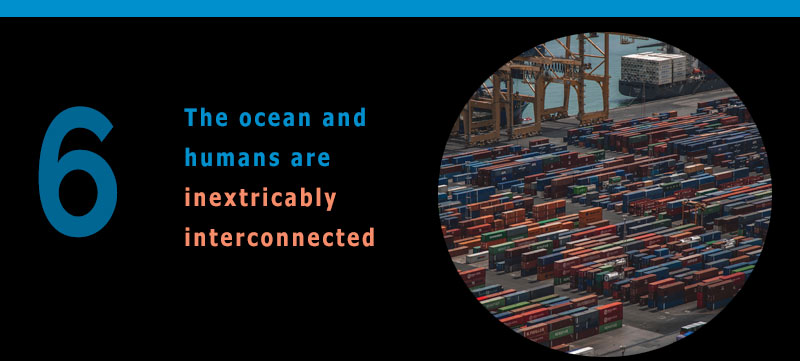Ocean and Humans Are Inextricably Interconnected: Part Seven of the Ocean Literacy Series
The Ocean Literacy Principles Series

We're discussing the concept of Ocean Literacy. In a series of premises defined by educators as fundamental to our understanding of ocean systems is the following:
The ocean and humans are inextricably interconnected.
The full extent of this statement is key to any future resolution of today's challenges to the natural health and social value of the ocean. First, there is the affirmation of human presence - action and reaction - in all aspects of the natural world. Denial of the impact, positive or negative, is simply not a fact of life. Second, there is the finality of inextricability, the certainty that there can be no separation one from the other, no compromise of the actuality of connection. Third, there are the implications of the prefix, inter: to be located or existing between, in the midst, as in inter-grated; to be reciprocal or carried on between, as in inter-national; or to be occurring among, as in inter-vening. There are linguistic subtleties here that relate to nuance that, when amplified to a global scale, have incontrovertible meaning and significance.
How can we better communicate this connection? For example, most students learn about the water cycle in their earliest science classes. They see and understand the circular inter-action between ocean water, evaporation, circulation in the atmosphere, and condensation into fog or rain or snow far inland that further deposits and flows through run-off, streams, lakes, rivers, to an extent ending back again in the ocean near or far from each drop's point of origin. It is simple, elegant, easy to explain, and so most students retain it as a fundamental understanding of a natural system. But what about the human impacts of this circulation? While these may seem obvious, it is surprising how disconnected this knowledge is from understanding of the social consequences of the cycle as essential for our daily lives in the form of drinking water, irrigation, sanitation, manufacture, and so much else. When we claim that the ocean begins at the mountaintop and descends to the abyssal plain, we are amazed at the surprise such a declaration engenders, as if we have re-defined the ocean far beyond and in some original way from how it is conventionally understood as a distinctly separate place apart from the land.
Another similar example pertains to our patterns of consumption and exchange. Most people don't understand that almost every thing we make or purchase for our use has its economy and efficiency affected by maritime transportation and trade. Much of our energy, appliances, electronics, automobiles, processed foods, computers and communications, and even financial products such as currency and trading, are produced somewhere else and exchanged via ships or underwater cables that are, even in port cites such as New York or Shanghai, located away from the concentrated populations that consume these goods and services. When we interrupt this delivery, as a result of market forces, tariffs, regulations, or other economic or political actions, this global network slows or stops with further devastating inhibition of world security and stability. This ocean system is invisible and necessary as a structure for the circulation of goods that unites us in the best of times and separates and alienates us in the worst.
Finally, there are connections of people and ideas. Never have the people of this world been more mobile, moving as business executives, tourists, migrants and refugees seeking opportunity or fleeing tyranny. Never have ideas and innovations been more shared between teachers, students, policy-makers, governors, creators, and curious individuals who find connection though art, language, and invention. We have all become inter-connected citizens of the world through media and information facilitated by the same network of connection that brings us to the admixture of things and people that we call civilization.
We look at a world map and we see the continents as if floating in a unifying ocean. It has been so since the beginning of time.
We are not separated by the ocean; the sea connects all things.
---
PETER NEILL is founder and director of the World Ocean Observatory and is author of The Once and Future Ocean: Notes Toward a New Hydraulic Society. He is also the host of World Ocean Radio, a weekly podcast addressing ocean issues, upon which this blog is inspired.
Other episodes in the Ocean Literacy series:
< 01: An Introduction
< 02: One Big Ocean
< 03: Ocean Shapes the Features of Earth
< 04: Weather and Climate
< 05: Ocean Made Earth Habitable
< 06: Diversity of Life and Ecosystems
- Login to post comments
-


